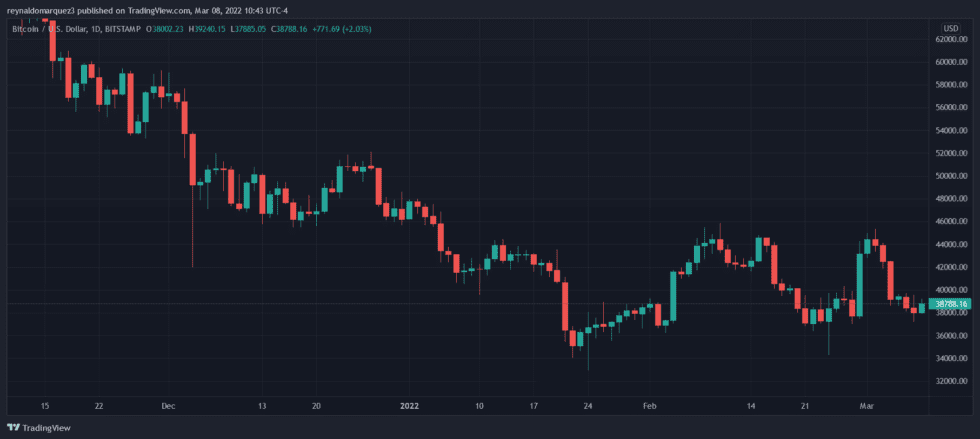The U.S. Financial Crimes Enforcement Network (FinCEN) has joined the list of international entities raising concerns over crypto aiding Russia to evade sanctions. The country was hit by unprecedented financial penalties after it invaded Ukraine.
Related Reading | TikTok To Stop Livestream In Russia Over ‘Fake News’ – What Now, Russian Crypto TikTokers?
In an alert posted on their website on March 7th, 2022, the U.S. entity advised financial institutions to “be vigilant against any effort to evade the expansive sanctions” and other restrictions with crypto. The alert also reminds financial institutions and other actors of their reporting obligations under the Bank Secrecy Act (BSA).
This referred to money services businesses (MSBs), such as crypto exchange platforms. The U.S. institutions called on these businesses and platforms to identified and report “suspicious activity associated with potential sanctions evasion”.
Furthermore, the U.S. institution suggests crypto exchanges and other businesses falling into the MSBs category to use “tools” that could allow them to comply with these demands. The alert says:
FinCEN also strongly encourages all financial institutions to make full use of their ability to share information consistent with Section 314(b)5 of the USA PATRIOT Act,6 and consider how the use of innovative tools and solutions may assist in identifying hidden Russian and Belarusian assets.
In particular, this section of the alert could be interpreted as the FinCEN asking exchange platforms and other businesses in the space to potentially eavesdrop on their clients. The U.S. Financial institutions dismissed the possibility that digital assets are a viable way for the Russian government to avoid sanctions.
However, sanctioned individuals, according to the alert, could still attempt to flee penalties via CVC or virtual currencies, as the FinCEN classifies cryptocurrencies:
While large scale sanctions evasion using CVC by a government such as the Russian Federation is not necessarily practicable, sanctioned persons, illicit actors, and their related networks or facilitators may attempt to use CVC and anonymizing tools to evade U.S. sanctions and protect their assets around the globe, including in the United States.
Exchanges Complied With Demands, Crypto The Worst Option To Evade Sanctions?
In that sense, the FinCEN shared several “red flags” for crypto exchanges and related companies to identified potential bad actors. First, it instructed these entities to monitor transactions using IP addresses from the Russian Federation or Belarus or jurisdictions with “AML deficiencies”.
In addition, exchange platforms will need to keep an eye on customers whose names were included in the Office of Foreign Assets Control (OFAC) list of sanctioned individuals. Finally, transactions coming from other platforms with AML and KYC “deficiencies”.
Mixers and similar services are also on FinCEN’s watchlist along with large transactions coming from “external wallets”.
Director of Communications for Coin Center Neeraj K. Agrawal highlighted the negative reactions towards cryptocurrencies from politicians and regulators. Commenting on a potential bill targeting this asset class for its possible use at evading sanctions, Agrawal said:
It’s been made clear over and over that the agencies tasked with sanctions enforcement do not think this is an issue.
Treasury dept knows there isn’t a realistic risk that Russia could use cryptocurrency to evade sanctions at a meaningful scale
We’re talking about multiple orders of magnitude larger flows of money than would be possible to conceal on a public ledger https://t.co/XnEHMbIcrm pic.twitter.com/3Bppmv2IEr
— Neeraj K. Agrawal (@NeerajKA) February 26, 2022
Crypto exchanges have been fast at complying with law enforcement requirements to prevent this issue. As Bitcoinist reported, Coinbase recently froze over 25,000 of its client’s accounts. Binance will soon follow by freezing its Mastercard and Visa cards in the Russian Federation.
Related Reading | Coinbase Conforms To Sanctions, Blocks 25,000 ‘Illicit’ Russian Crypto Wallet Addresses
Commenting on this measure, CEO at Binance, Changpeng Zhao said: “This is out of our hands. Not our decision”.
All Mastercard and Visa Cards issued in Russia will be unavailable on #Binance effective 2022-03-09, 21:00 UTC.https://t.co/gFixDDeIzy
— Binance (@binance) March 8, 2022
At the time of writing, Bitcoin trades at $38,944 with a 2.44% profit on the daily chart.


